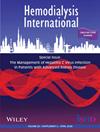Higher NT-proBNP levels and the risk of intradialytic hypotension at hemodialysis initiation
Abstract
Introduction
Elevated N-terminal pro B-type natriuretic peptide (NT-proBNP) is a potent predictor of adverse outcomes in hemodialysis initiation. These patients often experience intradialytic hypotension, which may partially reflect cardiac dysfunction, but the association of NT-proBNP with intradialytic hypotension is not clear.
Methods
We performed a post hoc analysis of a randomized trial that tested mannitol versus placebo in 52 patients initiating hemodialysis (NCT01520207). NT-proBNP was measured prior to the first and third sessions (n = 87). Mixed-effects models (adjusting for randomized treatment, sex, race, age, diabetes, heart failure, catheter use, pre-dialysis systolic blood pressure, pre-dialysis weight, ultrafiltration volume, serum sodium, bicarbonate, urea nitrogen, phosphate, albumin, hemoglobin, and session length) were fit to examine the association of NT-proBNP with systolic blood pressure decline (pre-dialysis minus nadir systolic blood pressure). Additionally, mixed-effects Poisson models were fit to examine the association with intradialytic hypotension (≥20 mmHg decline in systolic blood pressure).
Findings
Mean age was 55 ± 16 years; 33% had baseline heart failure. The median NT-proBNP was 5498 [25th-75th percentile 2011, 14,790] pg/mL; 26 sessions (30%) were complicated by intradialytic hypotension. In adjusted models, each unit higher log-NT-proBNP was associated with 6.0 mmHg less decline in systolic blood pressure (95%CI −9.2 to −2.8). Higher pre-dialysis NT-proBNP, per log-unit, was associated with a 52% lower risk of intradialytic hypotension (IRR 0.48, 95%CI 0.23–0.97), without evidence for effect modification by randomized treatment (P-interaction = 0.17).
Discussion
In patients initiating hemodialysis, higher NT-proBNP is associated with less decline in intradialytic systolic blood pressure and lower risk of intradialytic hypotension. Future studies should investigate if higher pre-dialysis NT-proBNP levels may identify patients who might tolerate more aggressive ultrafiltration.

 求助内容:
求助内容: 应助结果提醒方式:
应助结果提醒方式:


